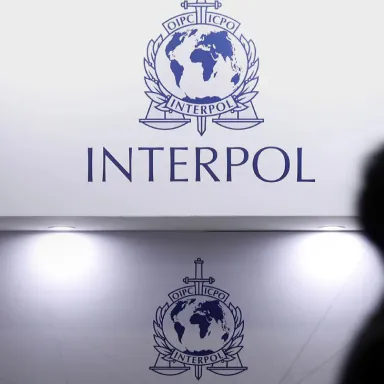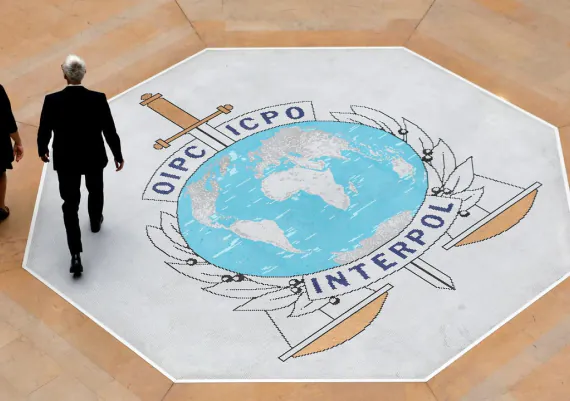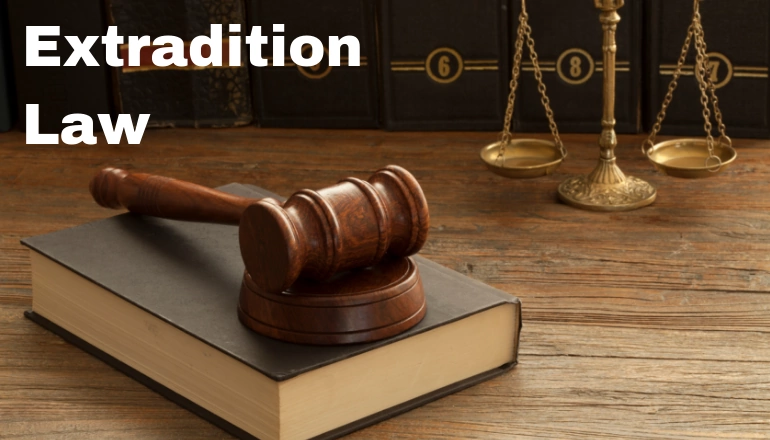Extradition in the United Arab Emirates
The United Arab Emirates often has the reputation of being a country where one doesn’t have to fear extradition requests. But is this really the case? The process of Dubai extradition is complex and governed by specific laws and international treaties. On this page, you’ll learn how extradition in the UAE works and how the right defense lawyers in Dubai can help protect you from unlawful extradition requests. Understanding the nuances is critical, and a specialized extradition lawyer in Dubai is often essential for navigating the legal system.

We are Extradition Lawyers
Extradition attorney Anatoliy Yarovyi has successfully represented clients in Dubai. He is well-equipped to assist in having your name removed from INTERPOL’s databases.

What Is Extradition?


What Is Extradition?
Extradition is the process of transferring a person accused or convicted of a crime from one country to another country for further legal proceedings. For instance, a crime is committed in one country. The suspect is identified, but authorities failed to detain them in time. The alleged criminal then flees abroad. To find him, a person is declared wanted internationally.
If the suspect is spotted in another country (including the UAE), they can be detained. Following that, the requesting country can submit a request for extradition Dubai, another emirate, or country. The goal is to hold the person accountable in the requesting country, where they committed the crime. This legal process facilitates judicial cooperation in criminal matters across the world.

How Does Extradition Work Under UAE Law?
The rules for extradition requests are based on international treaties and national legislation. The foundation of the UAE extradition law in Dubai and other emirates is Federal Law No. 39 of 2006. In 2023, it was amended by Federal Law No. 38.
Additionally, specific aspects of extradition are contained in the Constitution, the Criminal Code, and the Criminal Procedure Code of the UAE. In particular, the country’s Constitution prohibits the extradition of its own citizens and political refugees.

Federal Law No. 39 governs cooperation between the UAE and other countries in the field of criminal justice. It also contains conditions for a successful Dubai extradition:
- The act committed must be considered a crime in both states – in both the requesting country and the UAE.
- Extradition is possible if the person has already been sentenced to imprisonment for a term of 6 months or more, or if the crime’s sanctions stipulate a prison sentence of 1 year or longer.
- Extradition for political crimes in the requesting country is prohibited.
These are the 3 main criteria by which UAE courts assess extradition requests. Additionally, the requesting country must provide sufficient information about the case itself. This includes personal data and a detailed description of the person sought. Also, information about the crime such as legal classification, references to legal norms and legal documents.
If the requesting country does not meet the criteria or its request is not sufficiently justified, extradition can be avoided. To do this, it’s important to timely engage a qualified extradition lawyer Dubai. Our extradition law firm has been working in this jurisdiction for many years. Therefore, we know how to build an effective defense strategy against unlawful extradition.
Extradition Treaties of the UAE
Extradition involves at least two countries. Often, specific rules and conditions for extradition have already been established between them. These are contained in bilateral agreements. It’s important to know that the UAE supports international judicial cooperation in criminal matters. That’s why the UAE’s government has signed extradition treaties with many countries. This means that any of these nations can request the UAE to extradite someone, and this request may very well be fulfilled.

The importance of bilateral agreements cannot be overstated. They cover extradition terms, types of crimes, necessary documentation, and the procedures for handling requests. When providing legal services in Dubai (UAE) for Dubai extradition cases, we meticulously analyze bilateral treaties. Often, it’s there that we find grounds to deny the extradition of a client.
Countries with Extradition Treaties with the UAE
The United Arab Emirates has entered into extradition treaties with more than 50 countries. Primarily, these are “neighboring” and other Eastern countries: Saudi Arabia, Jordan, Egypt, Oman, and others.
The UAE has also signed an extradition treaty with many Western and European countries:
- United Kingdom. The agreement was signed back in 2008. However, in practice, the UK is reluctant to extradite individuals to the UAE. Because of this, British extradition requests are also often rejected. In such cases, the principle of reciprocity is important.
- Italy. The agreement was signed in 2018 and meticulously regulates the extradition Dubai procedure between the two countries.
- France. The relevant extradition agreement was signed back in 2007.
- Netherlands. The treaty between the two countries is relatively new – from 2023. However, it has already been tested in practice. In July 2024, the UAE extradited an alleged drug lord to the Netherlands.
- Australia. The agreement between this country and the UAE was signed back in 2007.
It’s important to understand: the absence of such an agreement does not guarantee a refusal of extradition from the UAE. For example, in the absence of such agreements an extradition request from these countries can still be considered and granted. A lot depends on the diplomatic relations between the countries.
Rights and Protections for Individuals Facing Extradition
If you’re facing extradition from Dubai (UAE), you need to clearly understand what rights you can use in your defense. Specifically, the individual requested has the right to protest against unfair and illegal extradition. For instance, if you are being persecuted for political reasons or if your rights will be violated in the country requesting extradition. To find a suitable basis for objection, it’s important to carefully analyze your situation with an experienced extradition lawyer Dubai.
From the moment of your arrest, you have the right to the assistance of extradition lawyers in the UAE. It’s not something you should neglect. In your case, the UAE’s extradition laws and the requesting country’s legal mechanisms will be involved. That makes it hard to defend yourself against an extradition request. The sooner experienced defense lawyers in Dubai get involved in your case, the better your chances are of avoiding extradition.
If the court does indeed issue a ruling for your extradition, you have the right to contest it. Such tasks fall within our legal services in Dubai. You have 30 days to file an appeal. The key is to find solid legal grounds. A review of your complaint could drag on for months. During this period, the enforcement of the order can be suspended.
Defense Strategies for Extradition Cases in UAE
To select and implement the correct defense strategy, it’s crucial to thoroughly analyze Dubai extradition laws, international documents, and bilateral treaties. It’s important to compare your situation with the current norms.
In general, the following reasons can be used to contest an extradition request:
- The requesting country did not provide sufficient evidence of your guilt. The accusations are unfounded or based on evidence that was obtained illegally.
- Have you previously been held accountable for a crime related to the extradition request?
- You face the death penalty, torture, or cruel, inhuman treatment if extradited, as well as violations of your rights.
- You are being persecuted for political reasons or discriminated against based on race, nationality, etc.
- If you are extradited, you will not be able to expect a fair investigation and an impartial trial.
- The statute of limitations for the crime has expired.
- The extradition request violates UAE legislation.
Our Law Firm’s Core Values in Dubai
Dubai is a dynamic business hub where the largest global companies and investment funds are concentrated. To confidently conduct activities here, it is important to enlist the support of professional lawyers. Among the top extradition law firms, our team is well-versed in local and international law.
Our lawyers and consultants have extensive experience in criminal, tax, and immigration law. We support clients’ projects in Dubai and beyond, offering comprehensive solutions. Dubai is renowned for its unique legal system. We know all the nuances of this system and provide effective legal support. With our defense lawyers in Dubai, you will gain confidence in complying with all legal regulations, the chance to minimise risks, and the ability to quickly resolve any arising legal issues.
Practice Area of Our Lawyers in Dubai
International searches and Interpol notices often jeopardize a person’s freedom of movement and business interests. If your name has appeared in the Interpol database or an arrest warrant has been issued against you, it is important to seek legal support from an experienced extradition lawyer Dubai. Our law firm specializes in assisting clients with cases related to Interpol notices and searches. By contacting us, you will receive comprehensive protection and an effective solution to your problem.
Interpol Lawyers in Dubai
Our lawyers in the UAE have extensive experience in international law and are well acquainted with the specifics of law enforcement practices. We provide comprehensive support: conduct legal analysis of your case, protect your rights in case of the threat of detention or extradition, advise on the procedure for submitting appeals to the CCF Commission, and interact with local authorities. As a result, you will receive an effective strategy for resolving issues related to international search and potential extradition Dubai.
Interpol Arrest Warrant in the UAE
In the UAE, extradition requests from Interpol are taken extremely seriously. If an arrest warrant has been issued against you, you may be detained by law enforcement authorities. We offer an assessment and legal analysis of the arrest warrant, coordination of preventive measures with local authorities, and preparation and submission of documents to protect your interests in UAE courts. Our team will help minimise the risks of unlawful detention or extradition and ensure fair consideration of the case.
Interpol Red Notice Removal in Dubai
Removal of an Interpol Red Notice is one of our most in-demand services. A Red Notice means you are wanted for a serious crime and may be detained. We will prepare a complaint to the CCF Commission, substantiating the invalidity of the notice. We gather evidence that the case may have a political nature or does not comply with Interpol’s Constitution. We liaise with the authorities of the UAE and other countries to remove obstacles to your movement.
Interpol Red Notice in Dubai
If you are faced with an active Red Notice from Interpol in Dubai, it is important to understand the specifics of local legislation. Our company provides legal support at all stages. We challenge the legality of the notice and strive to prove its inconsistency with the aims and principles of Interpol, which is a key part of any Dubai extradition defense.
Interpol Blue Notice in Dubai
A Blue Notice from Interpol usually implies a request for additional information. Our services include monitoring the Interpol database, preparing explanations and documents refuting involvement in a criminal case, and negotiating with law enforcement authorities in the UAE to prevent the escalation of the situation. Our objective is to prevent the conversion of a Blue Notice into a Red Notice and ensure legal safety for the client.
Interpol Green Notice in Dubai
The green notice concerns individuals who pose a threat to public safety. UAE authorities may restrict entry for such individuals. We will help prove the baselessness of the accusations and the absence of real risks, collecting and providing documents confirming non-involvement or rehabilitation.
Interpol Silver Notice in Dubai
A Silver Notice is used for searching for missing persons as well as individuals in need of assistance. Our lawyers will determine the status of the Silver Notice and the reasons for its issuance, and, if necessary, challenge the validity of the notice if the grounds for the search are no longer relevant.

Meet Our Extradition Lawyers Team in Dubai
When it comes to international criminal cases and extradition matters, it is important to work with a team of experts who possess not only deep knowledge in international law but also experience in the practical defense of clients’ interests. Our team of defense lawyers in Dubai is renowned for its expertise in various jurisdictions.
Our company unites highly qualified lawyers and solicitors with many years of practice in criminal law, international private law, UAE migration legislation, and cases related to Interpol notifications. We work in close cooperation with government authorities and colleagues worldwide, which allows us to provide prompt and effective protection of clients’ interests.
Dr. Anatoliy Yarovyi – senior partner of our company, an outstanding lawyer with more than twenty years of professional experience. He specialises in representing clients’ interests in the ECHR and Interpol on matters related to Dubai extradition, personal and business reputation, data protection, and freedom of movement.

Dmytro Konovalenko – a qualified lawyer with more than five years of experience in defending clients against unlawful Interpol notices and extradition requests. Dmytro is an active member of the International Bar Association and uses his knowledge to protect clients’ rights in complex legal disputes.

All our specialists have proven experience in handling international cases and extradition law. If necessary, we involve experts, translators, as well as lawyers in other jurisdictions.
Why Choose Us?
We possess deep expertise in extradition cases and Interpol notices. Our lawyers are not only familiar with UAE legislation but also have extensive experience in interacting with foreign courts and law enforcement agencies. We are proud that our firm is considered one of the leading extradition law firms, employing lawyers and consultants who have recognised authority both in the UAE courts and beyond.
We understand the full importance of the issues our clients come to us with. Therefore, in our work, we place emphasis on strict confidentiality and continuous support. You can rely on prompt communication with an extradition lawyer Dubai ready to answer any questions. By contacting us, you can count on comprehensive legal consulting without resorting to the services of multiple firms simultaneously.
How Can Our Extradition Lawyers Be of Assistance to You?
Our lawyers examine all the details of the extradition case: the arrest warrant, the request from the foreign state, as well as the grounds on which the charges are brought. We honestly and openly inform you about the risks and possible scenarios. Based on the collected information, we propose the most effective course of action, taking into account the specifics of UAE legislation and international agreements concerning extradition Dubai.
If the issue of extradition is already being considered by judicial authorities in the UAE, our lawyers will defend your interests at all stages. The experience of our solicitors allows us to challenge unlawfully issued notices and file appeals. If you are subject to any restrictions due to an extradition request, we will help you correctly prepare all the documents and understand how to legally stay in the UAE.
Contact us right now to receive an initial consultation and professional legal support. The sooner you obtain qualified legal assistance, the higher the chances of a favourable outcome.
Looking for Extradition Lawyers?
Securing a denial of extradition is a complex task. Therefore, it is recommended to entrust such matters only to an experienced extradition attorney in the UAE. The lawyers at our extradition law firm specialize in international law and extradition procedures. We practice within the jurisdiction of the UAE and many other countries, and we can help you defend against unlawful extradition.
Reach Out to Our Extradition Attorneys in the UAE
If you have been issued an international arrest warrant or are facing extradition, please contact our lawyers. For over 10 years, we have been providing legal services in Dubai and other emirates. To consult with our team, reach out to us using the contact information on this page.
Can I appeal an extradition order in the UAE?
Yes, you can appeal the extradition requests. The law sets a deadline for such an appeal – 30 days. The grounds for an appeal most often include procedural violations during the consideration of the request and potential threats to your rights in the extraditing country.
An experienced attorney will help you find the right arguments and develop an effective strategy for appealing an extradition request. Our legal services in Dubai include preparing your appeal and defending your interests in court.
Do all countries have extradition agreements with the UAE?
No, not all countries have extradition treaties with the UAE. However, about 50 states have signed such agreements. The UAE is focused on international partnerships, so the number of extradition treaties may increase. Moreover, the absence of an agreement does not guarantee a refusal to extradite.
What steps can I take if I am facing extradition?
As soon as you learn about a potential extradition, reach out to a lawyer. That’s the first step in protecting your interests. After analyzing the situation, the lawyer will develop a further action plan that aligns with the UAE legal procedures. It may include various steps.
First and foremost, you should contest the extradition request in the court of the country where you were detained. Concurrently, you can appeal against your search notice with Interpol authorities. Additionally, you should reach out to the courts and law enforcement agencies of the country requesting your extradition.
To consult with an extradition UAE attorney soon, please leave a request on this site.
Can you be extradited from UAE?
Yes, the UAE can extradite individuals to other countries if there is an extradition treaty between the states or if the extradition is carried out on the basis of the principle of reciprocity. However, the extradition process in the UAE has strict legal limitations.
Is Italy a non-extradition country?
Italy is not a safe haven from extradition but has strict limitations on its execution. According to Italian legislation, the state does not extradite its own citizens; extradition is only possible if there is a bilateral agreement and compliance with international standards.
Is there an extradition treaty between UAE and Germany?
Yes, there is an extradition treaty between the UAE and Germany, which was signed in 2008. According to this agreement, Germany and the United Arab Emirates can request the extradition of suspects and accused individuals. Requests are subject to review in accordance with international human rights standards and the legislation of both countries. Our lawyers in Dubai provide legal support in extradition cases, helping clients protect their legal rights and minimise risks.
Does Dubai have an extradition law?
Yes, the UAE has Federal Law No. 39 of 2006 on International Judicial Cooperation in Criminal Matters, which governs all matters of extradition from Dubai. This law establishes clear conditions and procedures for surrendering individuals, as well as grounds for refusal, providing a legal framework for such requests.
Can you be extradited from Dubai to the USA?
Yes, extradition from Dubai to the USA is possible, despite the absence of a formal extradition treaty between the two countries. The surrender of individuals is carried out on the basis of reciprocity and bilateral agreements for specific cases, which are handled through diplomatic channels.

Contact Us






